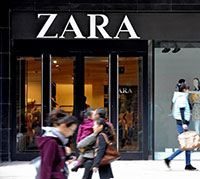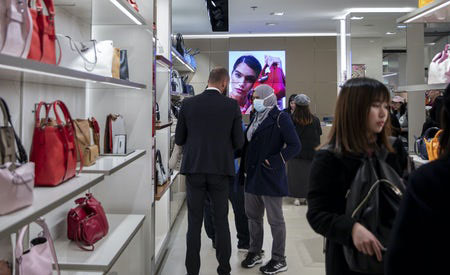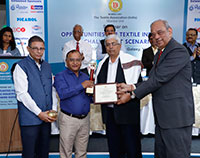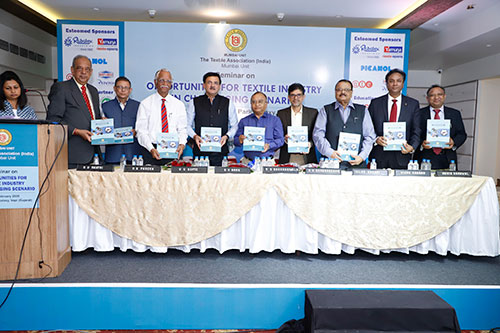FW
For the first time ever, Kingpins ,a renowned denim trade show is holding an online event Kingpins24 in lieu of its popular Amsterdam show in April.
“When one door closes, another opens. We believe Kingpins24 can give our global industry a chance to connect and share information. We have no other desire but to be a conduit for the denim world during these difficult times, where most of us, including me, are at home far away from our normal world”, avers Andrew Olah, founder of Kingpins Show. We, as a whole, are resilient, resourceful and optimistic, he added.
The online event will provide a live stream of panels, interviews, casual conversations and on-demand content to educate the industry in an interactive way. Kingpins24 will go live at 9 a.m. CET (Central European Time) on April 22 and end by midnight on April 23.
The goal, however is not to take the place of the trademark Kingpins show. Instead, it will provide helpful content surrounding the denim supply chain’s offerings for the upcoming seasons with the same energy that attendees are used to.
The event will also include exhibitor content. Presentations will focus on sustainability and corporate social responsibility updates to ensure partners are still able to connect with attendees despite being situated around the globe.
"Though Coronavirus (COVID-19) outbreak is disrupting supply chains for mid-market apparels in China, it is also affecting luxury sales as most of these US-listed luxury brands are dependent on China for their business. China is a major producer of cotton, fabrics and silk. Its factories churn out everything from coats to swimsuits for fashion brands from Hennes & Mauritz and UK’s Next to higher-end designers such as Tory Burch."
 Though Coronavirus (COVID-19) outbreak is disrupting supply chains for mid-market apparels in China, it is also affecting luxury sales as most of these US-listed luxury brands are dependent on China for their business. China is a major producer of cotton, fabrics and silk. Its factories churn out everything from coats to swimsuits for fashion brands from Hennes & Mauritz and UK’s Next to higher-end designers such as Tory Burch.
Though Coronavirus (COVID-19) outbreak is disrupting supply chains for mid-market apparels in China, it is also affecting luxury sales as most of these US-listed luxury brands are dependent on China for their business. China is a major producer of cotton, fabrics and silk. Its factories churn out everything from coats to swimsuits for fashion brands from Hennes & Mauritz and UK’s Next to higher-end designers such as Tory Burch.
The outbreak has led to five of its designers cancelling their fashion shows for Paris Fashion Week next week while brands Chanel and Prada have postponed their events planned for May in China.
Brands activate contingency plans to contain epidemic
To mitigate these effects in the Chinese market, Kering’s brand Gucci recently live-streamed its catwalk show for autumn-winter women’s collection in Milan, using Weibo, one of China’s biggest social media platforms. Viewers were also treated to a bird’s-eye view of the area where models were being made up. Several luxury brands also activated contingency plans that included closing stores and offices in China, scaling back product launches and advertising, and clamping down on staff expenses globally. This has created a somber mood across the country which is preventing conspicuous consumption.
autumn-winter women’s collection in Milan, using Weibo, one of China’s biggest social media platforms. Viewers were also treated to a bird’s-eye view of the area where models were being made up. Several luxury brands also activated contingency plans that included closing stores and offices in China, scaling back product launches and advertising, and clamping down on staff expenses globally. This has created a somber mood across the country which is preventing conspicuous consumption.
Delivery disruption to delay A/W collections
Retailers who follow a traditional two-season model with long lead times, have already dispatched most of their stocks for spring and summer. However, manufacturing and dispatch of autumn/winter stock is likely to be disrupted due to delayed return to work in China after the lunar New Year. Next has about £20 million inventory at risk in China as a delayed delivery to retailers is likely to result in the clothes arriving too late for the intended season and being marked down to sell.
Fast-fashion brands such as H&M and Zara usually have a diverse supply base in North Africa and Turkey and can shift volumes from one supplier to another which protects them against the disruption in China.
However, as Edited, a London-based retail data analytics start-up reveals, shipments of mass-market clothing from China to the US and UK are likely to fall by 3.5 per cent this year. New York-based company Hilldun Corporation is also worried about its designers missing their delivery deadlines, which will compel them to fly their products instead of shipping them. This will further intensify the insecurity for both Chinese factory owners and brands across the world.
 The Mumbai unit of the Textile Association (India) organised a One-day seminar on “Opportunities for Textile Industry in Challenging Scenario” on February 29, 2020 at Hotel fortune Park Galaxy, Vapi (Gujarat). The seminar was inaugurated by Rajnikant S. Bachkaniwala, Chairman, Palod Himson Machines.
The Mumbai unit of the Textile Association (India) organised a One-day seminar on “Opportunities for Textile Industry in Challenging Scenario” on February 29, 2020 at Hotel fortune Park Galaxy, Vapi (Gujarat). The seminar was inaugurated by Rajnikant S. Bachkaniwala, Chairman, Palod Himson Machines.
Rajnikant S. Bachkaniwala, Chairman, Palod Himson Machines delivered the inaugural address. “Where there is a crisis there is an opportunity. The Global Corona virus problem in China provides the Indian textile industry with an opportunity that we should not miss,” he said.
GV Aras, Director, Textile Engineering Group, ATE Enterprises delivered the key note address. According to him, though the textile industry offers many opportunities, industry leaders have not been able to grab them as we don’t have the capacity for bulk manufacturing. “Lack of logistics and disintegrated activities in the textile industry is increasing the cost of products in the industry,” he said. He further viewed that the ongoing coronavirus epidemic in China is impacting production in the country, which gives Indian industry multiple opportunities to increase productivity and and capture the international market.
him, though the textile industry offers many opportunities, industry leaders have not been able to grab them as we don’t have the capacity for bulk manufacturing. “Lack of logistics and disintegrated activities in the textile industry is increasing the cost of products in the industry,” he said. He further viewed that the ongoing coronavirus epidemic in China is impacting production in the country, which gives Indian industry multiple opportunities to increase productivity and and capture the international market.
A. A. Bambardekar, Works Director, Raymond (Textile Division Vapi), urged industry leaders to adopt new technologies to reduce their production costs. He also urged young students to enter the textile industry as they can help it grow through their innovative ideas.
The Textile Association (India), Mumbai Unit felicitated Madhubhai Mangukia, Chairman & Managing Director, Yamuna Machine Works with “The Lifetime Achievement Award” and Haresh Panchal, Managing Director, Rabatex Industries with “The Industrial Excellence Award” for their outstanding contribution in the field of textile industry.
The seminar ended with a panel discussion on the topic ‘Developments in Textile Industry to meet Emerging Market Trends. Moderated by Rajiv Ranjan, ED & CEO of Hindoostan Mills, the discussion focused on radical thoughts from the textile industry that would help the textile industry.
With the fashion industry being considered one of the world’s most polluting businesses-sectors, collaborating and knowledge sharing are key in finding solutions for a better future. Fully aware of this scenario, for the second year running, ISKO was the headline sponsor at Drapers Sustainable Fashion Forum, the authoritative event bringing together the most responsible players to discuss what can be done to tackle the industry’s environmental and social issues through innovation and creativity.
Sharing knowledge, collaborating for change
As evidence of its pioneering Responsible Innovation approach, ISKO shared its founding values of creativity, competence and citizenship by showcasing the R-TWO program, its latest responsible achievement, in a dedicated stand. Stemming from the mill’s holistic vision, R-TWO represents a great example of how reducing, reusing, and recycling strategies can be implemented in a textile business to improve its environmental performance. With the goal to create fabrics that can provide both quality and responsibility, ISKO has developed this platform, which deals with the most critical issue that apparel supply chains are currently faced with: using more than what actually needed. To this end, R-TWO reduces the amount of raw material sourced by using a blend of reused cotton and recycled polyester – both certified –, improving sourcing efficiency throughout the entire field-to-fabric production. This cutting-edge program effectively tackles over-sourcing – the leading issue when it comes to waste hierarchy. Reused cotton is certified with the Content Claim Standard – or CCS – from the Textile Exchange. As for recycled polyester, it can be either Recycled Claim Standard (RCS) or Global Recycled Standard (GRS) certified, depending on the content percentages. Together with this cutting-edge and fully responsible program, ISKO also uses automated laser technology developed in partnership with Jeanologia. At the event, ISKO incorporated this forefront solution into its stand, where guests could receive a personalized denim apron, showcasing this entirely responsible innovation.
How technology can help make the fashion industry more sustainable”: a special panel featuring ISKO
On March 11th, ISKO hosted a power talk on the event’s main stage. The discussion explored some of the pioneering advancements in technology that are making the fashion industry more responsible. From automated laser technology to integrated waste management processes and field-to-garment tracking systems, a selection of speakers illustrated how these achievements are reshaping the fashion industry. The panel was moderated by David Shah, internationally renowned consultant on design and marketing development, Publisher and CEO at Metropolitan Publishing BV and Associate Professor at ARTez (Arnhem, the Netherlands) and Associate Professor at Renmin University, (Beijing, China). The talk involved Keith O’Brien, ISKO Marketing & Business Development Manager, Victoria Soto, Jeanologia Custom Technology Consultant and Filippo Ricci, Fashion Open Studio Program & Partnership Manager. “Stepping up together is essential, when it comes to the development of better practices,” claimed Keith O’Brien, ISKO Marketing & Business Development Manager. “This is not something we can deal with alone, we need to rise up as one and be consistent in our quest for new, responsible solutions.”
A section of international buyers has informed Bangladeshi apparel exporters that they would reduce their existing export orders by 15-30 per cent amid an adverse impact of coronavirus outbreak in China and its subsequent spreading to many other countries across the world.
The government is assuring about all types of policy support to exporters to face the impact. Some buyers are requesting to make air shipment of export products while the others are seeking discount on prices The BGMEA also requested the Bangladesh Bank to extend all-out support so that exporters did not face any problem in banking related to release of goods which were now reaching the country after delay due to the outbreak.
Asean countries will persuade India to return to the negotiating table for the Regional Comprehensive Economic Partnership (RCEP) trade deal. India pulled out of the RCEP fearing a negative impact on its industries including textiles. It was felt that signing the RCEP would be a big setback for the Indian manmade fiber textile industry. The apprehension being felt by many industrial sectors and farmers on a possible flooding of the market with cheap imports once import duties on goods from China are pared was another reason. The current position of the Indian textile industry is not healthy.
Negotiations for the RCEP, which started in 2012, have targeted strengthening economic co-operation among the ten Asean members along with China, Japan, Korea, Australia, India and New Zealand. The RCEP is home to 30 per cent of the world’s population and 29 per cent of the world’s GDP. The initiative aims at being an Asean-led process through which Asean would broaden and deepen its economic engagements with its FTA partners. The RCEP is envisioned to lead to greater economic integration, support equitable economic development and strengthen economic cooperation among the countries involved.
Despite India’s withdrawal, the RCEP would still be a big free trade that sets a common trade rule.
The Philippines is planning to revive its textile and garment industries. Among other things, the plan is to put an end to the proliferation of used-clothing imports from North America and Europe that compete with domestic suppliers. Other strategies include better integrating the garment and textile sectors, earmarking capital and land to increase production, encouraging the purchase of new equipment, providing fiscal incentives to manufacturers through lower value-added taxes and reduced power rates, tackling infrastructure gaps and logistical bottlenecks, investing in product development and marketing, incorporating loom weaving into the school curriculum and cleaning up the textile value chain by requiring the registration of chemicals and substances. The corporate tax rate will be lowered from 30 per cent to 20 per cent over the next ten years.
The aim is to position the Philippines as one of the top 10 global garment and textile exporters with an annual export growth of 45 per cent. Garment export earnings are expected to be flat this year. At present, almost all its apparel production are halted due to delayed deliveries of raw materials from China, Korea, Taiwan and other Asian countries. The Philippines has no local source or back-up industries as every fabric, textile and accessory item is imported.
Pakistan plans to remove duties on many raw materials used by exporters. The aim is to make them more regionally competitive and help the economy escape a recurring boom-bust cycle. Discounted energy will be supplied to export-based factories. The devaluation and import duty cuts have improved Pakistan’s competitiveness, with exports expected to rise this fiscal year. More than half of Pakistan’s exports are textiles, with the industry now operating near maximum capacity.
Pakistan’s economic growth is seen decelerating to 2.4 per cent in the year through June, its weakest pace in more than a decade. Consumption growth slowed and investment contracted last fiscal year. To contain the damage from soaring deficits, Pakistan has devalued its currency by half over the past two years. Shipments from the South Asian nation have been largely stagnant over the past decade, a time when other developing economies like Vietnam and Bangladesh have seen their export sectors thrive. The European Union, which takes about one-third of Pakistan’s exports, has extended favorable access to its markets for two more years. Pakistan’s exports to Europe grew by 30 per cent in the two years after it received favorable access in 2014, but the pace has slowed since.
Huntsman Textile Effects has introduced a wash fast disperse dye. Terasil Blue W is designed to meet all major requirements for high performance sportswear and athleisure wear and leads to savings of water, energy and costs for mills. This dye is not sensitive to reduction. This leads to higher reproducibility, right first-time results and operational excellence. With cutting-edge disperse dye technology at its heart, Terasil Blue W has been developed by Huntsman Textile Effects to provide the leading solution for meeting the industry’s wash fastness requirements. Terasil Blue W offers an attractive shade and a high build-up for deep blues, which stay vibrant. The Terasil Blue W breakthrough technology raises the benchmark of wash fastness in the industry, helping mills overcome the challenges of dyeing polyester and its blends, while achieving production efficiency and sustainability.
Huntsman Textile Effects is the leading global provider of high-quality dyes, chemicals and digital inks to the textile and related industries. Huntsman is committed to an environmentally and economically sustainable textile value chain through its range of high-performance products. The demand for polyester and manmade fibers is booming as sports and athleisure apparel markets expand rapidly around the world. At the same time, brands, consumers and mills are increasingly focused on sustainability and performance resulting in raising demand for optimization of the costly, time consuming and resource intensive polyester dyeing process.
Oil price fluctuations affect all links of fashion’s value chain: fibers, transportation and consumption. The fashion sector depends on oil throughout its value chain. Logistics is one of the links of fashion’s value chain that’s dependent on oil. Fashion globalization, both in its sourcing and its distribution, forces the sector to build a transportation network by land, sea and air. In fact, most fashion exports move by boat, where petrol is the main fuel.
If the oil price war continues, one of the direct repercussions will be on the price of textile fibers derived from it, such as polyester, one of the most used fashion raw materials, or nylon, also derived from black gold. Polyester production has been increasing in recent years. Its production tripled between 2000 and 2017. Nylon production has also increased although its use in fashion is more residual.
The collapse of petrol is the result of a decision by Saudi Arabia, the greatest producer of crude oil in the world, to offer its oil at massive discounts. Price war in the oil market will also have a potential impact on the consumer’s spending power. The forecast for the oil market is even more pessimistic than in November 2014, when a similar price war began, as it adds to the significant collapse of oil demand due to the coronavirus.












